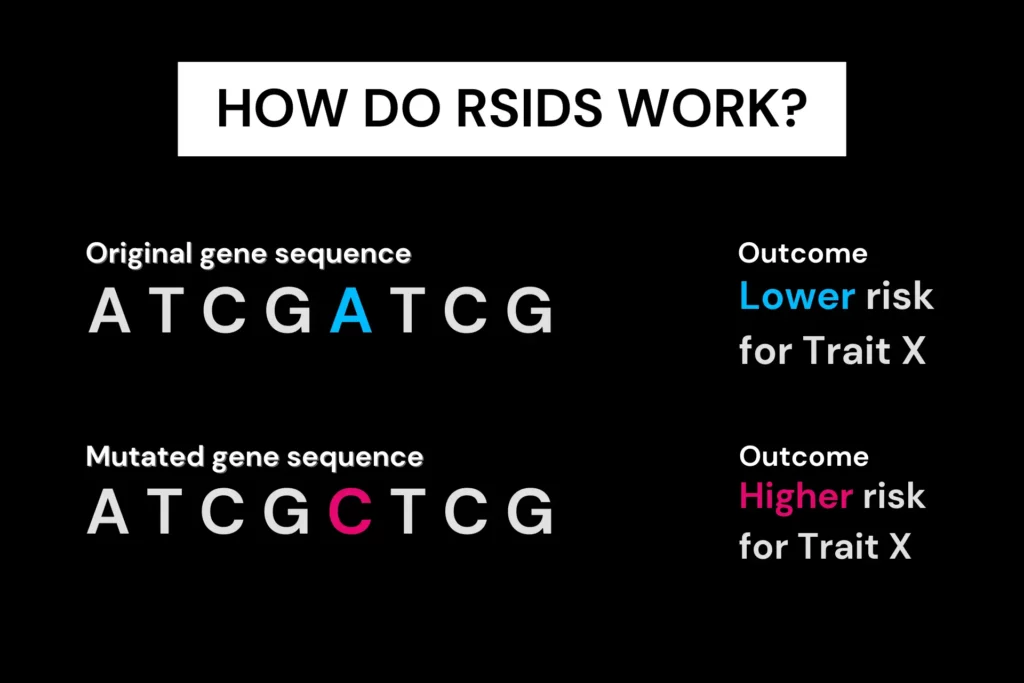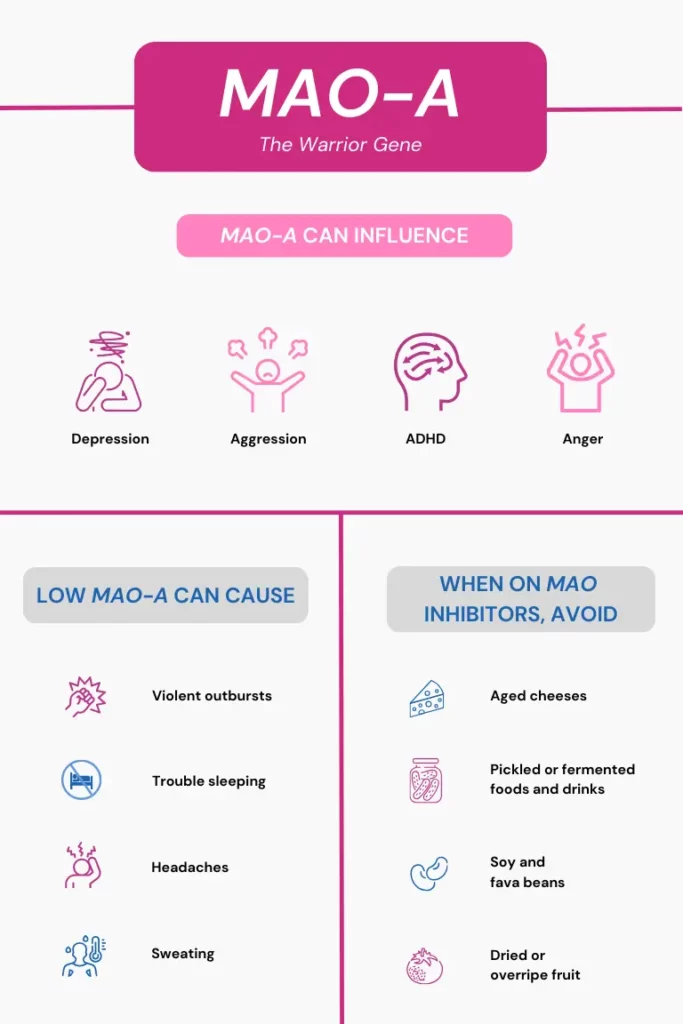The MAO-A gene, popularly nicknamed the “warrior gene,” produces the enzyme monoamine oxidase A (MAOA). It breaks down monoamine neurotransmitters (dopamine, epinephrine, and serotonin) through oxidation. Thus, mutations in the MAO-A gene can directly affect the levels of these neurotransmitters, potentially leading to various behavior-associated disorders. How much influence does this gene have on your personality?
Importance of MAO-A
MAO-A is an essential regulator of brain function and is highly expressed in the brain and heart cells. It mainly assists in the breakdown of neurotransmitters such as
- Dopamine (the happy hormone) is involved in mood, motivation and reward, arousal, memory, learning, focus, and movement control.
- Serotonin, which is involved in impulse control, affects regulation, appetite, and sleep.
- Epinephrine triggers the body’s stress and fight-or-flight responses.
Because MAO-A regulates the level of these “behavioral hormones,” too little or too much of this enzyme plays a role in several psychiatric and neurological disorders like schizophrenia and ADHD.
A class of drugs that inhibit this enzyme (MAOA inhibitors) is prescribed to treat depression.
Types Of The MAO-A Gene
We all have the MAO-A gene but carry different versions (or types or variants) of it.
Based on the number of times the sequence of the gene is repeated, there are two types of MAO-A genes: a high-activity (MAOA-H) and a low-activity (MAOA-L) type.
One of the most frequently studied variants is MAOA-4R, which has four repeats associated with high MAO-A enzyme activity.
Other forms of MAO-A include the 2-repeat (2R) and 3-repeat (3R) versions.
Monoamine Oxidase Deficiency
Monoamine oxidase A deficiency follows an X-linked inheritance pattern, primarily affecting males.
Lower levels of MAO-A typically result in the buildup of neurotransmitters in the brain.
This buildup manifests as unusual behavioral patterns involving aggressive outbursts and abnormal sexual behavior.
A deficiency of MAO-A has also been associated with abnormal brain development, which can directly lead to intellectual disabilities.
Lower levels of the enzyme result in a slower breakdown of the neurotransmitters, while higher levels of the enzyme equal a faster breakdown.
Lower and higher enzyme levels are popularly associated with ‘worrier’ and ‘warrior’ personalities, respectively.
Such differences happen through mutations at specific points in the gene sequence, known as RSIDs.
At a specific point, the sequence’s usual allele may be A, and this state of the sequence may be associated with some amount of risk for a given trait.
If a mutation occurs, and the allele at that point is now C, this state of the sequence may be associated with a higher or lower risk for that trait.

The Influence Of MAO-A On Your Personality
Increased Risk For Depressive And Bipolar Disorders
A study on around 18,000 people with psychiatric issues identified an SNP rs1137070 associated with major depressive disorder and schizophrenia.
People with the T allele had higher enzyme levels and, as a result, lower levels of the neurotransmitters.
Another study found that the G allele of rs6323 had the highest expression of the MAOA enzyme.
Subjects with major depressive disorder had the highest activity form of the enzyme (G or G/G).
Increased Risk For ADHD
A study identified an SNP rs3027407 on the MAO-A gene associated with ADHD.
This SNP affects dopamine-mediating action, which is related to the symptoms of ADHD in children. The A allele is more frequent in people with ADHD.
Increased Risk For Aggression
The T allele of rs909525 in the MAO-A gene is associated with less aggressive behavior due to the higher activity of MAOA - the warriors.
The C allele is associated with more aggressive behavior.
Increased Expression for Anger
A variation in the MAO-A gene was associated with higher levels of anger being expressed. The A allele of rs2064070 was also associated with increased anger expression.
This study also confirmed that mutations in rs909525 and rs6323 have links to increased anger expression, as mentioned previously.
| RSID (variation) | Expressed allele | Likely outcome |
| rs1137070 | T | Lower neurotransmitter levels |
| rs6323 | G | Poor temper, risk of depressive disorders |
| rs3027407 | A | Increased risk for ADHD |
| rs909525 | T | Less aggressive behavior |
| rs909525 | C | More aggressive behavior |
| rs2064070 | A | Increased anger expression |
Symptoms Of MAOA Deficiency
- Poor impulse control is seen in most boys with MAOA deficiency. They also exhibit aggressive or violent outbursts.
- People with MAOA deficiency may also experience sleep problems like trouble falling asleep or night terrors.
- Other symptoms include skin flushing, diarrhea, sweating, and headaches.

Am I A Warrior Or A Worrier?
While the MAO-A gene helps regulate your neurotransmitters (thereby affecting your mood), the relationship between genes and your behavior isn’t entirely straightforward.
The COMT gene also helps regulate dopamine levels, contributing to your ‘warrior/worrier’ personality.
Mutations in the COMT gene also influence your creativity and impulsivity levels.
Xcode Life’s Traits And Personality Report studies the COMT variations you carry, revealing more information on the genetic aspects of your personality.
It also provides genetic results for the Big 5 traits, leadership, empathy, cognition, and more.
Diet And MAO-A
A study found that a poor-quality diet during adolescence can affect the verbal ability of individuals with a low expression variant of the MAO-A gene.
People who rarely ate vegetables and consumed more junk food had verbal deficits in early adulthood.
The “psychopathic” personality traits were also observed more in subjects who frequently consumed fast foods during their adolescence - this was seen only in people with a low expression variant of the MAO-A gene.
Diet Recommendations For People On MAOA Inhibitors
MAOA inhibitors (MAOA-I) are a class of drugs that lower the enzyme MAOA levels. Higher MAOA levels have been linked to conditions like depression.
When on MAOA-I, it is crucial to limit high-tyramine foods. Tyramine is an amino acid that helps regulate blood pressure. MAOA enzyme is required to break down tyramine, the buildup of which is associated with migraines and life-threatening blood pressure spikes.
If you are on MAOA-I, it is vital that you reduce your tyramine consumption.
Some foods high in tyramine are:
- Aged cheese
- Pickled fermented foods
- Soybeans
- Sauces
- Dried or overripe fruits
- Alcoholic beverages
- Fava beans
The MAO-A Gene: Myths And Facts
MAO-A Is A Rare Gene
Everyone carries the MAO-A gene.
What differs among a population is the allele that is expressed, leading to either a ‘warrior’ or a ‘worrier’ personality.
The exact mechanism behind personality is more complex, but it’s essential to understand that everyone has the MAO-A gene and expresses it differently.
Lesser MAO-A, Higher Aggression
While the SNPs linked to MAO-A have links to increased aggression and anger expression, the link between genes and personality is far too complex.
Lesser MAO-A does affect how your neurotransmitters function, but other factors, like your immediate environment and circumstances, also affect your overall aggression levels.
You Could Be Heterozygous For MAO-A
MAO-A is an X-linked gene, and men only have one X chromosome.
Together, this means that the presence of one copy of MAO-A leads to its complete expression in men.
What differs is the level of its expression.
Summary: The MAO-A Gene And Personality
- MAO-A gene encodes an enzyme monoamine oxidase A (MAOA), which breaks down neurotransmitters like dopamine, serotonin, and epinephrine.
- There are two types of MAO-A genes: MAOA-L and MAOA-H. MAOA-L results in lower levels of MAOA enzyme, and MAOA-H results in higher levels.
- Lower MAOA results in the buildup of neurotransmitters, and higher levels of MAOA lead to a rapid breakdown of neurotransmitters—each with its own set of health risks.
- The A allele of rs3027407, C allele of rs909525, and A allele of rs2064070 result in lower MAOA enzyme levels - these are associated with an increased risk of ADHD, aggression, and increased anger expression, respectively.
- The T allele of rs1137070, the G allele of rs6323, and the C allele of rs2072743 result in higher MAOA levels, which are associated with an increased risk for depression.
- MAO-A inhibitors help treat depression by interfering with the breakdown of the amino acid tyramine. When on MAO inhibitors, it’s best to avoid tyramine-rich foods like aged cheese, alcohol, and overripe fruits.
Others Are Also Reading

What Is COMT Gene Mutation?

How To Deal With A Slow COMT Gene

Which Parent Carries The Autism Gene?
References:
- https://www.sciencedirect.com/topics/neuroscience/monoamine-oxidase-inhibitors
- https://en.wikipedia.org/wiki/X-linked_recessive_inheritance
- https://pubmed.ncbi.nlm.nih.gov/26227907/
- https://pubmed.ncbi.nlm.nih.gov/19593178/
- https://www.ncbi.nlm.nih.gov/pmc/articles/PMC4093913/table/T3/
- https://www.snpedia.com/index.php/Rs909525
- https://pubmed.ncbi.nlm.nih.gov/23111930/





